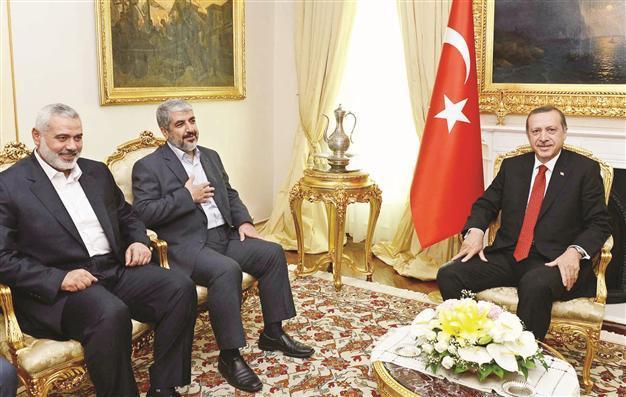Middle East ‘elites’: Turkey’s say in diplomacy on the rise
LONDON – ANKARA

Turkish Prime Minister Recep Tayyip Erdoğan (R) meets with Khalid Mashaal, the Hamas chief in exile (C), and Gaza’s prime minister Ismail Haniyeh in Ankara.
Turkey’s say in international politics is gaining strength and it will be the most powerful state in the Middle East in 10 years, according to a recent study conducted with participants from eight Middle East countries.Nearly 85 percent of the surveyed people think that Turkey has started to have "more of a say" in international politics, the report conducted by Fatih University said. The study made between March 15 and June 1 with 50 people from each country (Syria, Iraq, Lebanon, Israel, Palestine, Egypt, Libya and Tunisia) who have an “impact on the decision-making process or who have a high probability of influencing this process.” Participants included politicians, academics, civil society and press workers.
An approximately equal proportion, 85 percent, said Turkish foreign policy had "approached the Muslim world," in the report titled “How do Middle Eastern elites perceive Turkish foreign policy?” Most of the participants also had a perception of a "balanced" Turkish foreign policy between the West and the Muslim world.
The participants thought Turkey would be the most powerful state in the Middle East in 2023. Over 30 percent of the elites replied “Turkey” to the question “Which country do you think will be the most powerful state in the Middle East in 10 years?”
Iran was the second country seen as a regional power in the Middle East. However, in contrast with Turkey, Iran’s influence in the region dropped from 25 percent to 9 percent in 10 years. Iran is not among the interviewed countries as it is too difficult contact people within the country, the academics who took part in this study said.
Support for Turkey’s Syria policy
Almost 60 percent of the participants agreed that Turkish foreign policy’s final goal is to become the leader of the Muslim world as more than 50 percent believed that Turkey is acting as the protector of ancient Ottoman territory. None of the interviewed countries, including Israel and Syria, had a foe perception of Turkey. Almost 40 percent of the Syrian participants said Turkey was the country with which they had the closest relations. But most of the interviewed Syrian participants were opponents of the al-Assad regime.
The study said more than 50 percent of the participants thought that Turkey followed a sectarian foreign policy in the region and supported Turkey’s Syria policy as more than 60 percent of them thought that Turkey should support the Syrian opposition against the al-Assad regime and said Turkey should support a democratic, unitary Syrian republic in the post-al-Assad era.
On the possible establishment of a Kurdish state, more than 30 percent of them are in favor of the foundation of an independent Kurdish state in the Middle East while more than 50 percent oppose this idea.
















